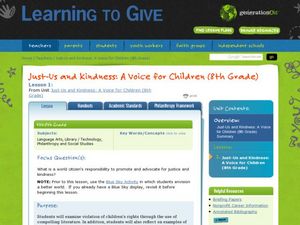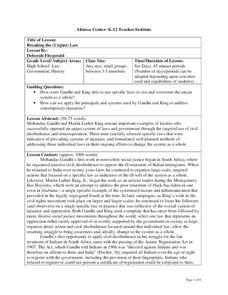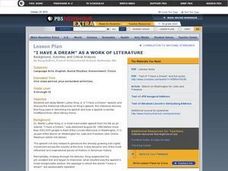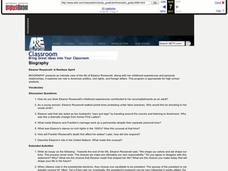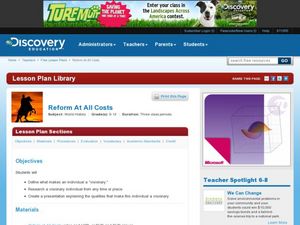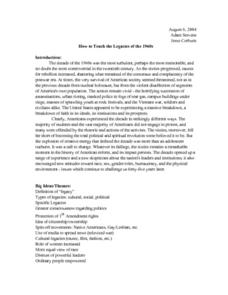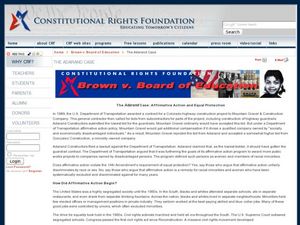Curated OER
Rosa Parks
Students examine the actions of Rosa Parks. They identify the reasons why philanthropy is good for the community and individuals. They write a letter to someone they admire because of their qualities.
Museum of Tolerance
The Price of Personal Responsibility
A reading of Patrick Henry's "Speech in the Virginia Convention," Henry David Thoreau's "Civil Disobedience," and Rev. Martin Luther King, Jr.'s "Letter from Birmingham Jail" launch a discussion about the price one is willing to pay to...
Curated OER
Harriet Tubman Warns "Kill the Snake Before It Kills You"
Harriet Tubman developed a rich extended metaphor for slavery and the imperative for Lincoln to abolish it in this dictated letter from 1862. Young historians read the original document and interpret Tubman's allegory with a pair of...
Curated OER
Just-Us and Kindness: A Voice for Children: King Day
Eighth graders investigate philanthropy. In this service learning lesson, 8th graders read human rights literature and use information gleaned to discuss children's rights around the world. Students discuss scenarios meant to prompt...
Stanford University
Beyond Vietnam
On April 4, 1967 Martin Luther King, Jr. delivered his speech "Beyond Vietnam." The controversy that followed is the focus of a three-instructional activity unit that asks class members to consider the political and social implications...
Roy Rosenzweig Center for History and New Media
Rosa Parks and the Montgomery Bus Boycott
Participants examine two documents related to Rosa Parks and the bus boycott, sources that challenge some of the commonly held preconceptions about Rosa Parks. They then respond to discussion questions to reinforce...
Curated OER
Breaking the Unjust Law
Students consider the concept of civil disobedience. In this lesson on changing unjust laws, students use primary sources to understand how Gandhi and King changed the law. Students will then list laws that they feel are unjust and plan...
Center for Civic Education
Martin Luther King Jr. and the Power of Words
It is easy to forget the power that written or spoken word can have in effecting change. Using quotations from such inspirational leaders as Maya Angelou, Mahatma Gandhi, and Martin Luther King Jr., encourage your class members to...
Curated OER
The Elderly Poor: Human Rights
Pupils examine facts about the elderly population of the United States that lives in poverty through the context of universal human rights. They participate in class discussion, review census records, read case studies, interview people...
Curated OER
Using the Amnesty Interactive CD-ROM
Students view the Amnesty Interactive CD-ROM and investigate different aspects of human rights around the world. They identify people who have contributed to human rights, documents from ancient to modern times that have contributed to...
Curated OER
The Power of Petitions
Young scholars discuss the power of using petitions to show support for a specific action. In groups, they create a petition for an issue of interest to them related to human rights following specific steps. They can take their...
Marybeth Lobiecki
Beyond Baseball with Jackie Robinson
Jackie Robinson was more than a baseball star, he was a prominent activist. The thought-provoking resource focuses on the life and achievements of Jackie Robinson, from his baseball career to his civic participation. Academics listen and...
Stanford University
United Farm Workers
What do primary sources tell people about important events in history? The assessment geared toward high school social studies focuses on primary sources. Learners analyze a poster and a blueprint to determine how the documents...
Curated OER
"i Have a Dream" As a Work of Literature
Students read and analyze Martin Luther King Jr.'s "I Have a Dream" speech. They answer discussion questions, and write and compose a speech that addresses an injustice in society.
Curated OER
Eleanor Roosevelt: A Restless Spirit
Students observe an intimate view of the life of Eleanor Roosevelt including her childhood experiences and personal relationships, it explores her role in American politics, civil rights, and foreign affairs.
Curated OER
Activating Students
Students view and analyze one example of student activism in the 1960's and then apply their learning to their own situations. They work cooperatively to develop and implement their own "activist" or community service learning plan.
Curated OER
Reform At All Costs
Eleventh graders examine the term visionary. In this World History activity, 11th graders research a specific individual who they feel is a visionary. Students develop a power point presentation.
Curated OER
Speak Out!
Young scholars are introduced to Yvonne Ranier's "Trio A" dance and investigate how to express concern over social issues through choreography. They research important issues from the 1960's, choreograph and perform original dances.
Curated OER
Billie Holiday's Song "Strange Fruit"
Pupils analyze a variety of primary source materials related to lynching (news articles, letters written to or written by prominent Americans, pamphlets, broadsides, etc.) in order to assess the effectiveness of the anti-lynching...
Curated OER
How to Teach the Legacies of the 1960s
Students consider which aspects of world around them have roots in 1960s, research and compare 1960s to today with regards to Civil and Women's Rights, Vietnam, counterculture, music, voting, and economic rights, and explore legacy of...
Curated OER
Sojourner Truth, African American Woman of the 19th Century
Students examine Sojourner Truth's philanthropist acts during her life. They discover that everyone has the right to be heard by their government. They compare and contrast the woman's movement and the anti-slavery movement.
Curated OER
The Chicano Movement in California - Culture, Causes, and Community
Students explore the culture and community of the Chicano movement in California using prints that emerged from the Chicano movement. The historical, binational, and bicultural components are examined in this three lessons unit.
Curated OER
The Adarand Case: Affirmative Action and Equal Protection
Eleventh graders examine the Adarand case. In this American Government instructional activity, 11th graders create a list of reasons for each affirmative action program. Students develop a defense on certain issues and...
Curated OER
Liberty Rhetoric
What is liberty rhetoric? Examine how people have used it in four different time periods and situations. High schoolers investigate original source documents and compare them with the Declaration of Independence to decide how liberty...





